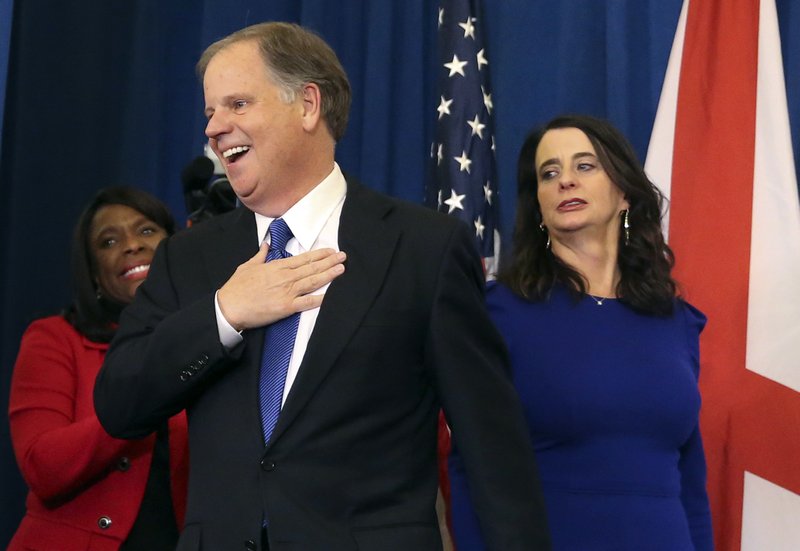MONTGOMERY, Ala. -- Democrat Doug Jones won Alabama's special U.S. Senate election Tuesday, beating back history, an embattled Republican opponent and President Donald Trump, who endorsed GOP candidate Roy Moore despite sexual misconduct allegations against the candidate.
It was the first Democratic Senate victory in a quarter-century in Alabama, one of the reddest of red states, and proved anew that party loyalty is anything but sure in the age of Trump.
As of 10:30 p.m. Tuesday, with all of the state's 2,220 precincts reporting, Jones held 49.9 percent of the votes to Moore's 48.4 percent. The remainder were write-ins.
The victory by Jones, a former U.S. attorney best known for prosecuting two Ku Klux Klansmen responsible for Birmingham's infamous 1963 church bombing, narrows the GOP advantage in the U.S. Senate to 51-49. It also injects energy into the Democratic Party's early push to reclaim House and Senate majorities in 2018.
The senator-elect, in his victory speech, said his win signaled a moment for national unity.
"I have always believed that the people of Alabama have more in common than divides us," Jones said. "We have shown the country the way that we can be."
Moore, meanwhile, declined to concede during a brief appearance at a campaign party in Montgomery. Instead, he raised the possibility of a recount.
"It's not over," Moore said. "We know that God is still in control."
Alabama law calls for a recount if the margin of victory is less than one-half of a percentage point.
Many Washington Republicans viewed the defeat of Moore as perhaps the best outcome for the party nationally despite the short-term sting. Positions taken by Moore, a Christian conservative, has alienated women, racial minority groups, gays and Muslims. He also faced multiple allegations of sexual misconduct with teens, one only 14, when he was in his 30s.
A number of Republicans, including Alabama's long-serving Sen. Richard Shelby, declined to support him. But Trump lent his name and the national GOP's resources to Moore's campaign in recent days.
Early Tuesday, Trump tweeted that Alabamians would "do the right thing."
He went on: "Doug Jones is Pro-Abortion, weak on Crime, Military and Illegal Immigration, Bad for Gun Owners and Veterans and against the WALL. Jones is a Pelosi/Schumer Puppet. Roy Moore will always vote with us. VOTE ROY MOORE!"
Later, he congratulated Jones on a "hard-fought" victory.
"The write-in votes played a very big factor, but a win is a win," Trump wrote on Twitter. "The people of Alabama are great, and the Republicans will have another shot at this seat in a very short period of time. It never ends!"
Former President Barack Obama and former Vice President Joe Biden, meanwhile, recorded robo-calls for Jones.
If Moore had won, the GOP would have been saddled with a colleague accused of sordid conduct as Republicans nationwide struggle with Trump's low popularity. Senate leaders had promised that Moore would have faced an immediate ethics investigation.
Jones takes over the seat previously held by Attorney General Jeff Sessions. The term expires in January of 2021.
Republicans on Capitol Hill have expressed hopes of scheduling a vote on their tax legislation before Jones is sworn in, but lawmakers are still struggling to devise a compromise bill to bridge the divide between the House and Senate legislation that can win majority support in both chambers.
A FIGHT OF IDEALS
At the center of the special election was Moore, a 70-year-old former judge who was twice ousted as state Supreme Court chief justice after flouting federal law. This year, he attempted a political resurrection against party officials disturbed by the accusations of his alleged sexual misconduct with teens.
He strenuously denied the allegations, which publicly surfaced for the first time last month.
"It's been a horrific battle," his wife, Kayla, said at an election-eve rally, where she sparked new upset by scolding the "fake news" for suggesting that her husband was insensitive to racial and other minorities.
"One of our attorneys is a Jew," she told reporters packed in a barn-style reception hall.
On the ground in Alabama on Tuesday, those who stood in line to cast their ballots were far more focused on the candidates than the broader political fallout.
"He's not a truthful man," 69-year-old Mary Multrie said of Moore. Multrie, who works in a children's hospital, was not influenced by accusations of sexual misconduct against Moore, she said, because she already did not like him. "He talks about God, but you don't see God in his actions."
She was among more than two dozen people queued up in the chilly morning air at Legion Field, a predominantly black precinct in Birmingham, to cast their ballots.
Al Bright, 63, who does refrigeration repair, said he voted for Moore.
"Regardless of the allegations against him, I believe he is an honorable man," Bright said.
Teresa Brown, a 53-year-old administrative assistant, said she preferred Jones, in part because he would be better positioned to work across party lines.
"We don't need a pedophile in there," Brown added.
Sessions, whose departure from the Senate prompted Tuesday's election, said Tuesday that he voted but did not say it was for Moore.
"I voted absentee," Sessions said in Baltimore, responding to a question from a reporter. "I value the sanctity of the ballot. The people of Alabama are good and decent. They'll make the right decision."
Ultimately, Tuesday's contest came down to which side better motivated its supporters to vote. Alabama Secretary of State John Merrill said ahead of the election that turnout likely would not exceed 25 percent of registered voters.
Jones fought to cobble together a coalition of blacks, liberal whites and moderate Republicans.
"This is an important time in Alabama's history, and we feel very confident where we are and how this is going to turn out," the Democrat said after casting his ballot Tuesday.
Moore, who largely avoided public events in the final weeks of the race and spent far less money on advertising than his opponent, was counting on the state's traditional Republican leanings and the strength of his passionate evangelical Christian supporters.
Moore sidestepped questions about sexual misconduct as he arrived at his polling place on horseback.
Alabama is one of the most Republican-leaning states in the nation.
Trump defeated Democrat Hillary Clinton in the state by nearly 28 points just 13 months ago. Yet Moore had political baggage that repelled some moderate Republicans even before allegations of sexual misconduct surfaced.
Virtually the entire Republican establishment, Trump included, supported Moore's primary opponent, Sen. Luther Strange, in September. Trump's former chief strategist, Steve Bannon, was one of the only early high-profile Moore backers.
Moore was removed the first time from his position as state Supreme Court chief justice after he refused to remove a boulder-size Ten Commandments monument at the state court building. The second time, he was permanently suspended for urging state probate judges to refuse marriage licenses to same-sex couples.
The Republican also argued that a Muslim shouldn't be allowed to serve in the House because of his religion, has criticized the science of evolution, and wants to make homosexual conduct a crime and restore a ban on gays serving in the military.
In his final pitch before polls opened across the state, Jones called the choice a "crossroads" and asked that "decency" prevail.
"We've had this history in the past, going down the road that ... has not been productive," Jones said. "We've lagged behind in industry. We've lagged behind in education. We've lagged behind in health care. It's time we take the road that's going to get us on the path to progress."
Information for this article was contributed by Kim Chandler, Steve Peoples, Bill Barrow and Emily Wagster Pettus of The Associated Press; by Sean Sullivan, David Weigel, David A. Fahrenthold, Elise Viebeck, Michael Scherer, Philip Rucker, Scott Clement, Larry Bleiberg and Jenna Johnson of The Washington Post; by Mark Z. Barabak and Lisa Mascaro of the Los Angeles Times; and by Arit John of Bloomberg News.
A Section on 12/13/2017

